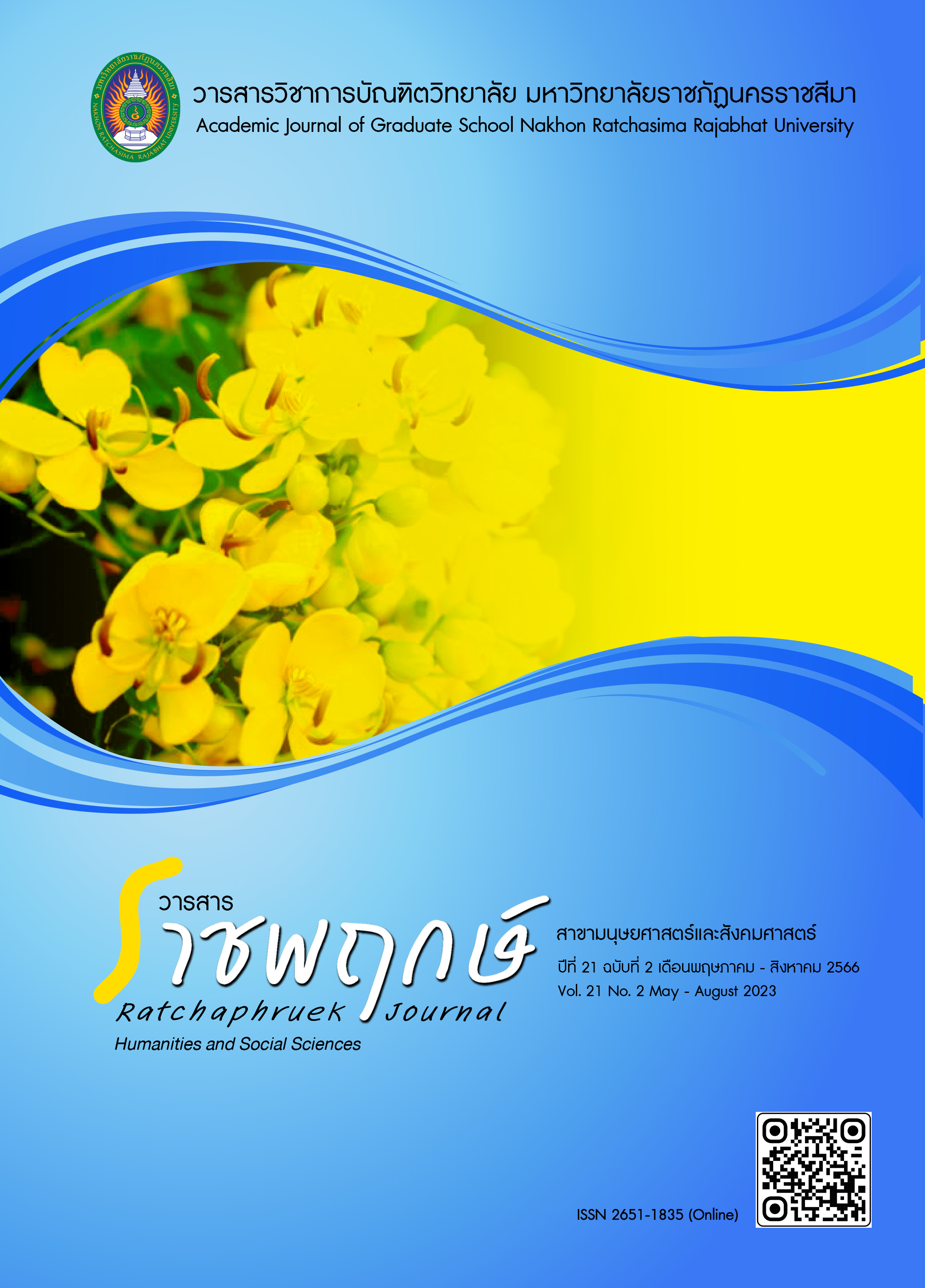The Generativity and Environment Attitude toward Green Products of Consumers in Different Generation Groups: A Case Study in Nakhon Ratchasima Province
Main Article Content
Abstract
This research aims to investigate 1) the generativity, 2) the attitude of the environment, and 3) the relations between the generativity and attitude of the environment of the consumer in different generations. The sample size was determined using Cochran's formula for the unknown population. The data were collected using the measurement of the values for generativity and environmental attitudes acquisitions were collected from 385 Thai consumers in Amphoe Mueang, Nakhon Ratchasima, Thailand. The group is divided into 4 generations; including Generation B, 35 people, Generation X, 95 people, Generation Y, 150 people, and Generation Z, 105 people. The data were analyzed by using inferential statistics (Pearson's correlation coefficient) at a significance level .01
The research showed that 1) the generativity of different generations of consumers was nonsignificant; 2) the attitude toward the environment of different generations of consumers in awareness of information and knowledge about green products were significance level .01, but the new ecological paradigm (NEP) scale was nonsignificant, and 3) the high negative relationships between different generations consumers and new ecological paradigm were significance level.01 (r = - 0.789)
Article Details

This work is licensed under a Creative Commons Attribution-NonCommercial-NoDerivatives 4.0 International License.
References
กัลยา วานิชย์บัญชา. (2561). การวิเคราะห์สถิติ: สถิติเพื่อการตัดสินใจ (พิมพ์ครั้งที่ 4). กรุงเทพฯ: โรงพิมพ์แห่งจุฬาลงกรณ์มหาวิทยาลัย.
ขวัญชีวา ไตรพิริยะ (2559). การรับรู้ ความรู้ และการยอมรับเทคโนโลยีโทรทัศน์ชุมชนของพื้นที่ชุมชนชายแดนภาคตะวันออก ประเทศไทย, วารสารนิเทศศาสตร์ธุรกิจบัณฑิตย์, 10(2), น. 233-258.
ชนากานต์ อุณาพรหม. (2565). พฤติกรรมการซื้อผลิตภัณฑ์ที่เป็นมิตรกับสิ่งแวดล้อมของผู้บริโภคในตำบลโพนงาม อำเภอหนองหาน จังหวัดอุดรธานี. วารสารมหาวิทยาลัยพายัพ, 32(2), น. 32-49.
ชูศรี วงค์รัตนะ. (2560). เทคนิคการใช้สถิติเพื่อการวิจัย (พิมพ์ครั้งที่ 3 ฉบับปรับปรุงเพิ่มเติม). กรุงเทพฯ: ศูนย์หนังสือจุฬาลงกรณ์มหาวิทยาลัย.
ณัฐณิชา นิสัยสุข และขวัญกมล ดอนขวา. (2558). ปัจจัยที่มีผลต่อพฤติกรรมการซื้อผลิตภัณฑ์ที่เป็นมิตร กับสิ่งแวดล้อมของผู้บริโภค, วารสารชุมชนวิจัย มหาวิทยาลัยราชภัฏนครราชสีมา, 9(2). น. 57-67.
ไณยณันทร์ นิสสัยสุข. (2559). ค่านิยม ทัศนคติ และพฤติกรรมการซื้ออผลิตภัณฑ์ที่เป็นมิตรกับสิ่งแวดล้อม (วิทยานิพนธ์มหาบัณฑิต, มหาวิทยาลัยบูรพา).
มัลลิกา บุนนาค. (2555). สถิติเพื่อการวิจัยและตัดสินใจ (พิมพ์ครั้งที่ 8). กรุงเทพฯ: โรงพิมพ์แห่งจุฬาลงกรณ์มหาวิทยาลัย.
รัชนีกร ด่านศิริชัยสวัสดิ์. (2560). การศึกษาเจตคติด้านสิ่งแวดล้อม: กระบวนทัศน์ใหม่เชิงนิเวศ. วารสารเทคโนโลยีอุตสาหกรรม มหาวิทยาลัยราชภัฏอุบลราชธานี, 7(2), น. 13-30.
ศิริจรรยา เครือวิริยะพันธ์ และโอปอล์ สุวรรณเมฆ. (2563). การศึกษารูปแบบการดำเนินชีวิตของผู้บริโภคกลุ่มเจเนอเรชั่นแซท. วารสารบริหารธุรกิจศรีนครินทรวิโรฒ, 11(1), น. 23-43.
อาภา เอกวานิช และบุหงา ชัยสุวรรณ. (2562). ปัจจัยที่ส่งผลต่อความตั้งใจซื้อ ผลิตภัณฑ์ที่เป็นมิตรต่อสิ่งแวดล้อม.วารสารสุโขทัยธรรมาธิราช, 32(1), น. 125-140.
Allport, G. (1935). Attitudes: handbook of social psychology. Worcester: MA-Clark University Press.
Becker, E. (1973). The denial of death. New York: Free Press.
Cochran, W. G. (1953). Sampling techiques. New York: John Wiley & Sons.
Cronbach, L. J. (1990). Essentials of psychological testing. (3rd ed.). New York: Harper & Collins.
Dunlap, R. E. (2008). The New Environmental Paradigm scale: from marginality to worldwide use. The Journal of Environmental Education, 40(1), pp. 3-18.
Dunlap, R. E., Van Liere, K. D., Mertig, A. G. & Jones, R. E. (2000). New trends in Measuring environmental attitudes: measuring endorsement of the New Ecological Paradigm: A revised NEP scale. Journal of Social Issues, 56(3), pp. 425-42.
Erikson, E. H. (1950). Childhood and society. New York: Norton.
Inthasang, C., Sinthusiri, N. & Chaisena, Y. (2020). Green Product and Green Perceived Value Effect on Purchase Intentions. WMS Journal of Management, 9(3), pp. 31-41.
Jump, N. (1978). Psychometric theory. (2nd ed.). New York: McGraw Hill.
Likert, R. (1976). The human organization; its Management and Value. New York: Mc Graw-Hill.
McAdams, D. P. & Aubin, E. D. (1992). A theory of generativity and its assessment through self-report, behavioral acts, and narrative themes in autobiography. Journal of Personality and Social Psychology, 62, pp. 1003-1015.
Schiffman, L.G., Kanuk, L. L. (1994). Consumer behavior. Englewood Cliffs, NJ: Prentice-Hall.


